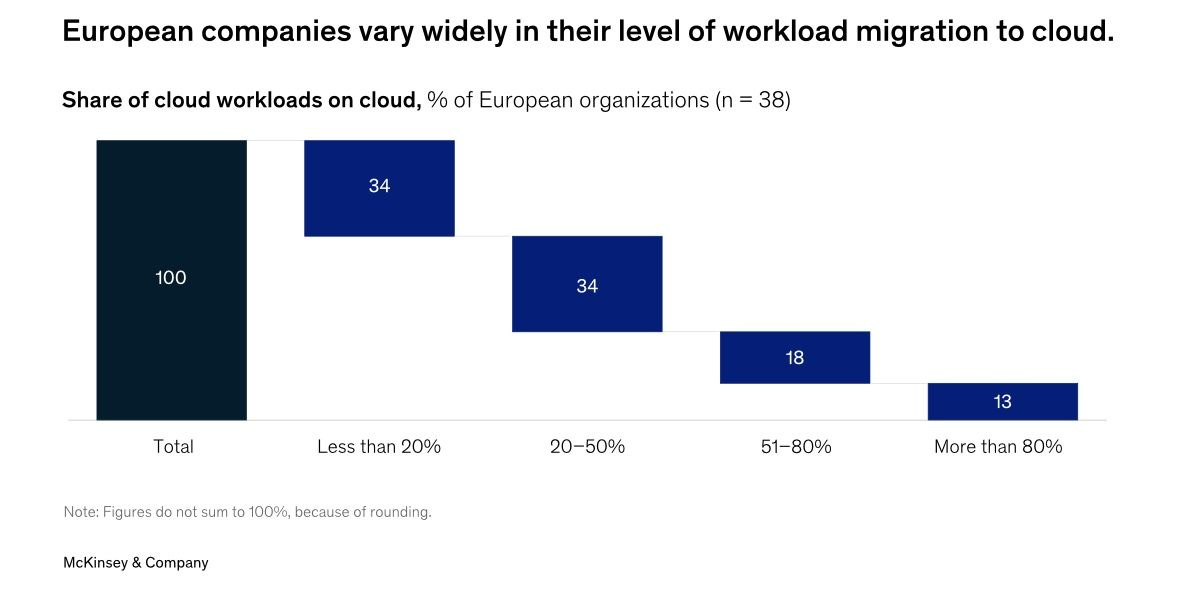☁️ Developer-First #142 - Catch me if you can
AI needs the Cloud, but European enterprises are still behind
Hello friend,
Beyond foundation models, the true potential of Generative AI lies in adapting AI to proprietary enterprise data.
But here’s the catch: training, integrating, and scaling AI requires workloads and data to be in the cloud. And for European enterprises, that’s still a major hurdle.
In 2024, less than a third of European companies had migrated over 50% of their workloads to the cloud (McKinsey & Company).
The real bottleneck for AI adoption in enterprises isn’t technology or model maturity—it’s cloud migration. Until infrastructures catch up, scaling AI across organisations will remain limited.
So where’s the opportunity?
✅ The growth of AI in enterprises will be driven by infrastructure modernisation and system integrators orchestrating these transitions.
✅ On-prem and private cloud inference solutions will see strong demand, as some workloads will never move to the public cloud due to security, sovereignty, and cost concerns.
We’re at the inflection point where AI adoption will depend as much on cloud strategy as on AI strategy. Are you seeing this as well?
P.S.: I recently released the 2024 Global Developer-First Transactions Report. If you missed it, click here to access the report.
P.P.S.: if you're a CTO or tech leader, consider joining the free Unicorn CTO Slack community. We're a small group of international CTOs and tech leaders, and we often meet for virtual (or not) coffees.
Now, let's dive into last week's developer-first transactions.
💰 Market Summary - Week of February 24th, 2025
8 companies raised $89 million across 4 product categories in 3 countries.
Europe-based companies attracted 18% of the total funding vs 82% for North America-based companies.
Security is the category that attracted the highest funding.
2 companies provide or contribute to an open-source product.
3 companies were acquired this week.
🧩 Funding by Product Category
🌎 Funding by Region
🏢 Funding By Company
Edera, from Seattle 🇺🇸, raised $15 million in a seed funding round led by M12. Edera is transforming container security with its enterprise infrastructure solutions, featuring a type 1 hypervisor and a Rust control plane for secure, cost-effective multi-tenancy in Kubernetes and AI workloads. (more)
Lovable, from Stockholm 🇸🇪, raised $15 million in seed funding led by Creandum. Lovable is developing revolutionary software that enables anyone to create software, unlocking human creativity and changing the way software is built. (more)
Prime Intellect, based in San Francisco 🇺🇸, raised $15 million in Series A funding led by Founders Fund. Prime Intellect democratises AI development by providing a platform that makes global compute resources accessible for training state-of-the-art models, fostering open AI innovations. (more)
Rad Security, also in San Francisco 🇺🇸, secured $14 million in Series A funding led by Cheyenne Ventures. Rad Security provides an AI-driven platform to secure AI workloads and cloud infrastructure with real-time, behaviour-driven defence, enhancing enterprise AI systems’ security. (more)
Dreadnode raised $14 million in Series A funding led by Decibel Partners. Dreadnode specialises in offensive AI, developing systems that either match or surpass human capabilities in security applications. (more)
Archipelo, from San Francisco 🇺🇸, raised $12 million in seed funding led by Dell Technologies Capital. Archipelo’s Developer Security Posture Management Platform integrates with developer workflows to manage risks and ensure compliance efficiently. (more)
Continue, also in San Francisco 🇺🇸, raised $3 million in seed funding led by Heavybit. Continue develops open-source IDE extensions and a hub for AI code assistants, enhancing developer productivity with custom tools and shared resources. (more)
LangWatch, in Amsterdam 🇳🇱, secured $1 million in seed funding led by Passion Capital. LangWatch offers comprehensive tooling for enhancing AI models, focusing on optimisation and mitigating risks like data leakage and model hallucinations. (more)
🤝 Mergers & Acquisitions
DataStax, based in Santa Clara 🇺🇸, has been acquired by IBM. DataStax offers an AI Platform as a Service, enabling developers to create GenAI applications that scale ambitiously. The platform integrates extensive data management capabilities, enhancing IBM’s WatsonX AI portfolio. (more)
Voyage AI, located in Palo Alto 🇺🇸, was acquired by MongoDB. Voyage AI specialises in building embeddings models that enhance retrieval accuracy and relevance across various applications, aligning with MongoDB’s strategy to redefine database functionalities with AI capabilities. (more)
Dashdive, from San Francisco 🇺🇸, was acquired by Rhombus Systems. Dashdive’s unique technology attributes cloud costs directly to customers, teams, products, and features, optimising financial oversight for cloud resources using advanced observability tools. (more)
⭐️ Trending GitHub Repositories
langgenius / dify (✩ 4,883 stars this week) - Dify's intuitive interface combines AI workflow, RAG pipeline, agent capabilities, model management, observability features and more, letting you quickly go from prototype to production.
mastra-ai / mastra (✩ 4,825 stars this week) - The TypeScript AI agent framework. ⚡ Assistants, RAG, observability. Supports any LLM: GPT-4, Claude, Gemini, Llama.
siyuan-note / siyuan (✩ 2,883 stars this week) - A privacy-first, self-hosted, fully open source personal knowledge management software, written in typescript and golang.
👍 Trending Developer-First Products on ProductHunt
Basalt (👍 774) - Basalt is the platform to build and operate AI features : Craft high-quality prompts with our AI-powered Copilot, test and evaluate LLM outputs, deploy seamlessly with our SDK, monitor and refine performance in real conditions—all in a collaborative workflow.
TestAI (👍 502) - Because AI Should Just Work : Real-world simulation & evaluation for voice & chat agents. Automated testing, call analytics, and trust & safety reporting ensure flawless performance.
GPT-4.5 (👍 493) - GPT-4.5 is our most advanced model yet, scaling up unsupervised learning for better pattern recognition, deeper knowledge, and fewer hallucinations. It feels more natural, understands intent better, and excels at writing, programming, and problem-solving.





